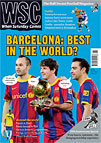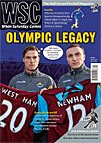 Arsene Wenger is a man who has always stayed loyal to his purist footballing vision, but is it now time to abandon his principles?
Arsene Wenger is a man who has always stayed loyal to his purist footballing vision, but is it now time to abandon his principles?
The terms used for the teams at the top of the Premier League have changed during 2010-11; the group once revered as the Big Four are now the more ambivalent “traditional Big Four”. While Liverpool have appeased the masses (and media) by bringing back “King Kenny”, Arsenal have no such party trick available to them.
The club’s defeats in three Cups between February 27 and March 12 were greeted by a deep despairing groan. After all, apparently Arsenal haven’t won anything recently and, according to David Anderson in the Mirror, “in addition to the flowering of daffodils, another unerring sign of spring is the Gooners’ season disintegrating”. The Sunday Telegraph’s Oliver Brown worried that six years without silverware may be “too much to bear” for Arsenal fans, while in the Observer Paul Hayward described a “merciless vortex” and a “night of a thousand agonies” in Barcelona.
Encouraged by the likes of Emmanuel Petit claiming that Arsenal were “cracking up”, many commentators attempted a deeper interpretation. In the Times, Tom Dart muttered darkly of “long-held weaknesses”, “an underlying psychological block” and that: “If Arsenal did not need a session on the therapist’s couch before, perhaps they do now.” A cognitively minded Duncan Castles backed this up in the Sunday Times: “In times of trouble football teams, like individuals, tend to regress to their fundamentals.”
Affectionate epitaphs were prepared in advance for Arsène Wenger. Mick Dennis of the Daily Express offered a defence: “Wenger’s ‘business model’ is a beacon of hope for a game dominated by dosh. If he fails again, the light will go out. Money will have won.” But most were harsher. The News of the World mocked What’s your excuse this time Arsene? and the Sunday Express wondered whether Arsenal’s manager was now “more manic and barmy than Gallic and charming”, questioning Is le Prof losing le Plot? A prevalent leitmotif of the criticism was reference to Wenger’s new choice of outerwear – a voluminous knee-length puffer jacket. In the People, Dave Kidd asked: “Will the Arsenal board ever seriously question the man in the technical area with the sleeping-bag coat and the increasingly crazed demeanour?”
Indeed, while attention was focused elsewhere, it was quietly announced that the president of the International Fencing Federation, Alisher Usmanov, had increased his Arsenal stake to “over 27 per cent”. The Russian billionaire has previously called for heavy investment in the team and failed with a proposal of a rights issue to raise transfer funds in 2009. If Usmanov continues his gradual share accumulation, Wenger may well be forced to consider his policy of prudence. And further internal uncertainty at the club should worry the manager far more than cod psychology, generalised football “philosophy” or whether his giant padded coat is slightly too big for him.
From WSC 291 May 2011
 The FA took a principled stance over the FIFA presidential election but they remain as equally flawed in their governance of the Premier League
The FA took a principled stance over the FIFA presidential election but they remain as equally flawed in their governance of the Premier League

